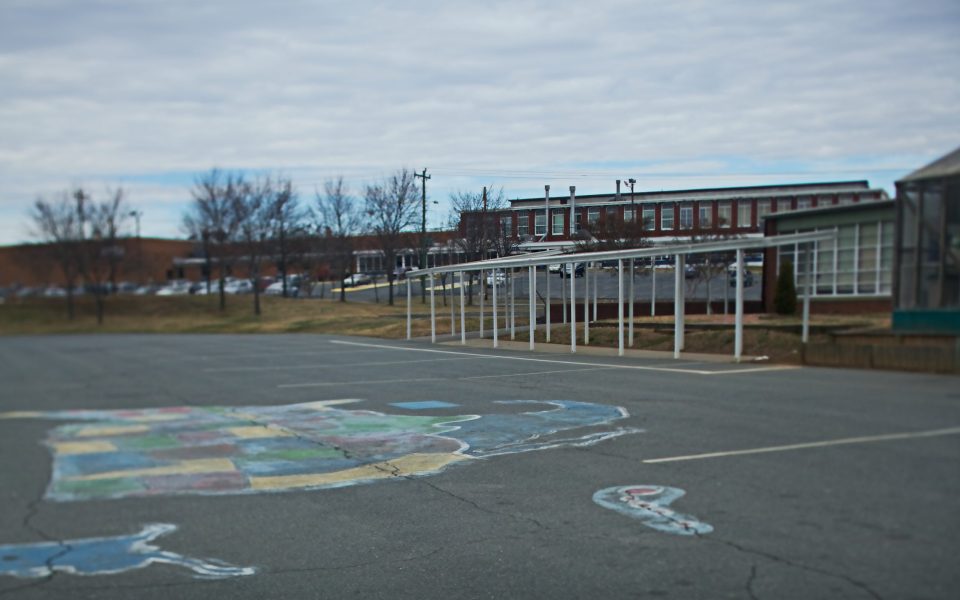Featured photo: Hanes Middle School in Winston-Salem. (photo by Caleb Smallwood)
The kids are not alright.
An estimated 17 percent of Americans under the age of 18 have or have had a mental health disorder, according to the National Center for Education Statistics in 2018 — and that’s before the global pandemic.
Pre-pandemic, Winston-Salem Forsyth County Schools and Guilford County Schools prioritized social- emotional learning (SEL) through their strategic goals and curriculum. SEL helps students develop self-awareness and interpersonal skills. These skills help children better cope with impulse control, emotion management and everyday challenges. However, a global pandemic that continues to infect and kill thousands of people each week is not an everyday challenge.
During the 2020-21 school year, WSFCS and GCS implemented several programs and ideas meant to ease some of the stress COVID-19 was putting on students, not just academically.
Forsyth County schools opened Main Street Academy as a night school for students who had to become providers or caregivers for their family during the day. Guilford County implemented a youth crisis hotline that students could call 18 hours a day to vent some of their troubles or talk to mental health professionals.
And with both counties returning to in-person learning on Monday, parents, teachers and students will be reflecting on the ways the past year and a half has affected students, and how the pandemic will continue to affect their mental health.
KJ Morgan, a Guilford County parent, said the pandemic school year affected the mental health of her high schooler, who she did not want to name for privacy reasons.
“It was their junior year, the most important year, and everything went wrong at once,” Morgan said. “The social part of school was really important for them and to not have that, took a toll.”
Although their child is dual-enrolled at Guilford Technical Community College, Morgan said her student was overwhelmed during the pandemic.
“Most people aren’t this independent until college,” she said. “They are not ready to be this totally responsible for their education and that took a toll too.”
This year, Morgan’s child is eager to return to the classroom and get back on track. For educators and staff, Guilford County School’s Director of Health Services and Nursing Yvetta Grier is working to make sure they are ready to help students like Morgan’s.
Grier said the school district trains teachers, counselors and social workers on trauma-informed care. Because teachers are the ones who see the children day in and day out, they would be the first in the school to recognize an issue, she said. They noted that teachers have received and continue to receive professional development training to help identify triggers and learn practices to help children deal with trauma and manage their emotions.
Denise Patterson, Guilford County Schools’ chief of student services, also said that the county led virtual workshops for parents in the spring to help parents become more aware of what their children could be going through and how to recognize it, including addictions and mental health disorders or illnesses.
The need for more school counselors
Tricia McManus, Forsyth County’s superintendent, said that it is absolutely a responsibility of schools to look after the mental health of its students.
“The students want and need support,” she said. “It’s definitely our responsibility as educators to address that need. School is a safe haven for many students. They get positive interaction and for many it’s a very important space.”
Grier said that Guilford County is concerned about the whole child, that mental health has to be addressed for the student to be successful in the class and in the community. It is difficult to teach a student about math or science when their mind is on other things, she said.
Educators in both counties are working to make it easier to access mental health resources at school, where kids spend about 15 percent of their lives.
In the Triad, while every school has access to mental health assessment services, there is not a mental health professional exclusively assigned to each school. Guilford County has 50 school psychologists for 126 schools. Winston-Salem/Forsyth County schools has about 25 psychologists serving its approximately 80 schools.
Nationally, during the 2018-19 school year, there were roughly 425 students for every school counselor, which exceeds the American School Counselor Association’s recommended ratio of 250 to 1, according to data from the Education Commission of the States, a national education research and policy organization.
During the 2017–18 school year, about 51 percent of public schools in North Carolina reported providing diagnostic mental health assessment services to students, according to the National Center for Education Statistics.
McManus said that increasing the number of mental health professionals is a part of the strategic plan to better reach students.
“Students today are better advocates for themselves,” she said. “They want us to start applying new methods. We’ve talked about adding wellness rooms, changing discipline policies and using more restorative measures. If you have things that are weighing heavily on your mind or you’re dealing with trauma, that’s got to be addressed for you to really be able to learn at your best.”
Kara Anglin is a licensed clinical social worker who works mostly with young people of high school and college age. She said that in the last seven years, she’s seen an increase in school related anxiety, depression and suicidal ideation but that could be because of a decrease in the stigma.
“Adolescence is such a difficult time in terms of development,” Anglin said. “They’re naturally exploring their independence so there’s this push and pull where they want to be independent, but they also need the root structure.
“[During the pandemic] their in-person social outlets haven’t been there so there’s a larger proportion of adolescents having less social interaction and feeling more disconnected,” she continued.
In addition to the use of school counselors, Anglin advocates for students and parents to use outside resources such as therapy to help students if they need it.
“Parents struggle with when and how to get involved with their teenagers,” she said. “Therapy is a place to process how you want to handle things, something that isn’t necessarily tied to the family.”
For more on how kids are coping with returning to school, check out our article here. For how teachers are feeling, go here.
Learn more about Guilford County Schools’ mental health support for students at gcsnc.com/Page/26779. For Winston-Salem/Forsyth County Schools, visit wsfcs.k12.nc.us/Page/785.
Join the First Amendment Society, a membership that goes directly to funding TCB‘s newsroom.
We believe that reporting can save the world.
The TCB First Amendment Society recognizes the vital role of a free, unfettered press with a bundling of local experiences designed to build community, and unique engagements with our newsroom that will help you understand, and shape, local journalism’s critical role in uplifting the people in our cities.
All revenue goes directly into the newsroom as reporters’ salaries and freelance commissions.


Leave a Reply